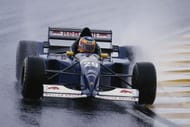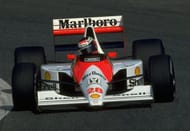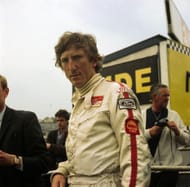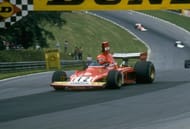When you think of nations which have produced great Grand Prix talents, Austria isn't one that usually springs to mind, but it should be. Two world champions and another race winner hail from the mountainous central European state, and the Austrian Grand Prix has been on the Formula 1 calendar in over 30 seasons and it will continue for the foreseeable future.
Red Bull have also been a huge success, the Austrian-registered outfit have won 4 driver's and constructor's championships since joining in 2005. However, there hasn't been an Austrian driver on the Formula 1 grid since Christian Klien's stand-in appearances for HRT back in 2010, so the future doesn't look too bright on this front.
#5 Karl Wendlinger

Karl Wendlinger may have only had three full seasons in Formula 1, but in that short time, he proved himself to be a good driver. The Austrian had a short stint with the March team towards the end of 1991, and this convinced the British outfit to hire him for the following year. Wendlinger was impressive, finishing as high as fourth in Canada, which put him ahead of his teammate Paul Belmondo in the driver's standings.
March's finances were waning, and Wendlinger jumped ship to join the Sauber team for 1993, their first season in F1. In a tight season-long battle with JJ Lehto, Wendlinger came out on top, scoring on four occasions during the season. Wendlinger looked as though he was going to have a much better year in 1994, scoring points in two of the opening three rounds, but his season was cut short thanks to a terrifying crash at Monaco which could've claimed his life. This caused the then 25-year-old to miss the remainder of the season, and Karl was never the same again, as a brief comeback in 1995 yielded poor results when compared with his teammate Heinz-Harald Frentzen.
#4 Alexander Wurz

Alexander Wurz is perhaps better known for his exploits in enduring racing, winning the 24 hours of Le Mans twice, but the Austrian also had a successful F1 career. Midway through the 1997 season, Wurz was drafted into the Benetton team to stand-in for Gerhard Berger, someone we'll get on to soon. Mechanical troubles in Canada and a spin in France thanks to a sudden rain storm didn't leave a good impression on the team. However, a podium in Britain showed his speed and he was made a full time drive for '98. Wurz remained at Benetton until the year 2000, and did a solid job during this period, although he wouldn't stand on the podium during this time.
Wurz joined McLaren for 2001, but only as a test driver, he'd have to wait until 2005 for another start. Despite not starting a race for over four years, Wurz steered his McLaren to a podium finish at Imola. Williams hired him for 2006, again as a test driver, but 2007 would be the year in which he returned to F1 racing. Alex was outscored by 20-13 by Nico Rosberg over the course of the year, but you have to remember that Wurz was going up against a future World Champion. There was one more podium during this time, but a lack of consistent points sealed his fate and he wouldn't drive in Formula 1 again.
#3 Gerhard Berger

There's a strong argument that can be made that Gerhard Berger is one of the best drivers to never win an F1 driver's title. This is in part due to the fact that the Austrian ace was driving during F1's "Golden years" of the late 80's and early 90's. Berger had to overcome the results of some horrific crashes, such as his awful incident at Imola in 1989 and his road car accident in 1984, both of which could've ended his life.
A brief debut for ATS at the end of 1984 put him on the F1 radar, and after a decent season with arrows in '85, Benetton hired the big Austrian for 1986. This would be the breakthrough year for the then 26-year-old, as he'd take his first win thanks to an ingeniously simple no-stop strategy in Mexico. Berger's rise continued for 1987, as Ferrari came calling and he joined Formula 1's most prestigious team, Enzo Ferrari's final driver signing. 4 wins in three years was a good return, especially considering McLaren's dominance during this time, a team he'd join and partner Ayrton Senna at for 1990. Senna and Berger had an excellent relationship on and off the track, during a time when the Brazilian legend won two of his three titles.
They say that Ferrari never asks you to join them twice, but that wasn't the case with Berger, as he rejoined the Italian outfit for 1993. He'd claim Ferrari's first win in 4 years at the Hockenheimring in 1994 (a track he was particularly good at) and finish his joint-highest in the driver's championship that year, third overall. Berger would retire after returning to Benetton, being in a unique position of claiming the team's first and last victories, 11 years apart.
#2 Jochen Rindt

Like Berger, Jochen Rindt competed during another one of F1's golden eras, the 1960's. After a single appearance for Rob Walker's racing team in 1964, Cooper hired the youngster full-time for 1965. The Cooper wasn't the best car during his time there, but he did finish third overall in the driver's championship in 1966, just behind John Surtees in the same machinery.
He earned what must've seemed at the time to be a dream move to Lotus for 1969, to replace the late great Jim Clark, but the Austrian would tragically suffer a similar fate. '69 was a building year, claiming his first win in the sport at Watkins Glen. 1970 was one of the most dominant displays by a driver ever, Rindt won five of the first eight rounds and all-but guaranteed the driver's world championship by the time he arrived at Monza. Tragedy would strike in qualifying, however, as Rindt flew off the track and into the barriers, ending his life. He was only 28-years-old, and he became the first and hopefully only ever F1 posthumous world champion. Had he lived, he would've won more championships if he stayed at Lotus, there's little doubt about that.
#1 Niki Lauda

Niki Lauda is perhaps best known these days for his direct and no-nonsense comments about the sport we all love, but he was absolutely ruthless as a driver too.
After 3 years spent with March and BRM between 1971 and '73, Lauda was tasked with bringing Ferrari back to the forefront of the sport in 1974, after the Scuderia hadn't won a championship for a decade. Niki's first win came at Spain that year and the seeds of recovery were firmly planted in Maranello. 1975 brought Lauda's first driver's world championship, winning 5 Grands Prix along the way.
1976 could've easily been the end of the road for Lauda, after the Austrian was nearly burned alive in a horrifying accident at the old Nurburgring, the green hell living up to its infamous name.
Niki had led the championship comfortably to that point and was lucky to escape with his life, before he sensationally returned to racing at the Italian Grand Prix, 5 weeks after his near-death experience.
Lauda would miss out on the title that year, but 1977 was his redemption year, with another 3 wins getting him his second driver's title. On a side-note, Lauda is the man with the second-most wins for Ferrari in F1 with 15 in total, no prizes for guessing who beats him to top spot there. Niki would move to Brabham for 1978, a team that had a fast car (he finished on the podium every time he made the chequered flag), but it was woefully unreliable, retiring more often than not. That poor finishing record was exaggerated in 1979, and the Austrian legend retired ahead of 1980.
Lauda was coaxed out of retirement by McLaren for 1982, and he'd come out on top in another epic title scrap in 1984, beating his teammate Alain Prost by half a point, the smallest winning margin ever. Undoubtedly one of the best drivers in F1 history.
But who do you think is the best F1 driver to come out of Austria? Is Luada or another legend? Let us know in the comments below!
